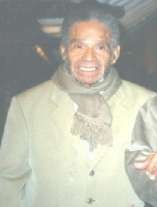Manuel Zapata Olivella
Manuel Zapata Olivella (Santa Cruz of Lorica, Córdoba, 17 March 1920 – Bogota, 19 November 2004) was a doctor, anthropologist and Colombian writer.
Manuel Zapata Olivella | |
|---|---|
 Photo of Zapata Olivella at the Liga Latinoamericana de Artistas. | |
| Born | Manuel Zapata Olivella 17 March 1920 Santa Cruz de Lorica, Colombia |
| Died | 19 November 2004 (aged 84) Bogota, Colombia |
| Occupation | Doctor, anthropologist, writer |
| Nationality | Colombian |
| Period | 1947–2004 |
| Notable works |
|
Biography
When he was a boy, his father, the professor Antonio María Zapata Vásquez, moved with his family to Cartagena de Indias. Zapata Olivella's younger sister, Delia Zapata Olivella, was a Colombian dancer and folklorist.[1]
He studied Medicine in the National University of Colombia, in Bogota. In Mexico City, he worked in the Psychiatric Sanatorium of Dr. Ramírez and afterwards in the Hospital Ortopédico of Alfonso Ortiz Thrown. He also worked for the magazine Time and for the magazine Events for All. It argued against his brother Virgil by defending the United States, but he later changed his mind after being racially discriminated during a trip to the country.
During his stay in Mexico, he wrote the unpublished novel "Bitter Rice". He published several studies on the cultures of Afrocolombians. He taught in several universities of United States, Canada, Central America, and Africa. He founded and directed the literary magazine National Letters.
The main theme of his narrative is the history and the culture of the inhabitants of the Colombian Caribbean, especially the lives of blacks and natives. His most important work is the novel Changó (1983), an extensive work that is presented as an epic of the afroamericanos, narrating their origins in Africa.[2] In a sense, Changó is a culmination of all of his previous writings.[3]
His previous novel In Chimá is born a saint (1964) was a finalist in two contests, the Esso of 1963, in which it was defeated by Gabriel García Márquez with The bad hour, and the Prize of Brief Novel Seix Barral, in which first place went to The city and the dogs by Mario Vargas Llosa.
Works
Short stories
- 1948 – Pasión vagabunda
- 1952 – He visto la noche
- 1954 – China 6 am
- 1961 – Cuentos de muerte y libertad
- 1962 – El cirujano de la selva
- 1967 – ¿Quién dio el fusil a Oswald?
- 1990 – Fábulas de Tamalameque
Novels
- 1947 – Tierra mojada
- 1960 – La calle 10
- 1963 – Detrás del rostro
- 1963 – Chambacú, corral de negros, honorable mention at the Premio Casa de las Américas (1963)
- 1964 – En Chimá nace un santo
- 1983 – Changó, el Gran Putas 1983 – Historia de un Joven Negro
- 1986 – El fusilamiento del Diablo
- 1989 – Hemingway, el cazador de la Muerte
Essays
- 1997 – "La rebelión de los genes"
Libros que escribió en Inglés ==
- Chambacu, Black Slum, translator Jonathan Tittler, Latin American Literary Review Press, 1989, ISBN 9780935480399
- Changó, the Biggest Badass.
See also
References
- Appiah, Kwame Anthony (2005). Africana: The Encyclopedia of the African and African American Experience. Oxford University Press. p. 605. ISBN 9780195170559. Retrieved 25 May 2016.
- Luca. "Manuel Zapata Olivella y la afrocolombianidad – Aurora Boreal". auroraboreal.net. Retrieved 2 October 2015.
- Captain-Hidalgo, Yvonne (1993). The Culture of Fiction in the Works of Manuel Zapata Olivella. University of Missouri Press. ISBN 0826208916.
External links
- Colombian oral history archive, Manuel Zapata Olivella Collection of Vanderbilt University Special Collections